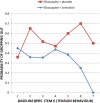Differential impact of anxiety symptoms and anxiety disorders on treatment outcome for psychotic depression in the STOP-PD study
- PMID: 24656524
- PMCID: PMC4078996
- DOI: 10.1016/j.comppsych.2014.02.001
Differential impact of anxiety symptoms and anxiety disorders on treatment outcome for psychotic depression in the STOP-PD study
Abstract
Background: There are conflicting results on the impact of anxiety on depression outcomes. The impact of anxiety has not been studied in major depression with psychotic features ("psychotic depression").
Aims: We assessed the impact of specific anxiety symptoms and disorders on the outcomes of psychotic depression.
Methods: We analyzed data from the Study of Pharmacotherapy for Psychotic Depression that randomized 259 younger and older participants to either olanzapine plus placebo or olanzapine plus sertraline. We assessed the impact of specific anxiety symptoms from the Brief Psychiatric Rating Scale ("tension", "anxiety" and "somatic concerns" and a composite anxiety score) and diagnoses (panic disorder and GAD) on psychotic depression outcomes using linear or logistic regression. Age, gender, education and benzodiazepine use (at baseline and end) were included as covariates.
Results: Anxiety symptoms at baseline and anxiety disorder diagnoses differentially impacted outcomes. On adjusted linear regression there was an association between improvement in depressive symptoms and both baseline "tension" (coefficient=0.784; 95% CI: 0.169-1.400; p=0.013) and the composite anxiety score (regression coefficient = 0.348; 95% CI: 0.064-0.632; p=0.017). There was an interaction between "tension" and treatment group, with better responses in those randomized to combination treatment if they had high baseline anxiety scores (coefficient=1.309; 95% CI: 0.105-2.514; p=0.033). In contrast, panic disorder was associated with worse clinical outcomes (coefficient=-3.858; 95% CI: -7.281 to -0.434; p=0.027) regardless of treatment.
Conclusions: Our results suggest that analysis of the impact of anxiety on depression outcome needs to differentiate psychic and somatic symptoms.
Copyright © 2014 Elsevier Inc. All rights reserved.
Figures


References
-
- Tollefson GD, Holman SL, Sayler ME, Potvin JH. Fluoxetine, placebo, and tricyclic antidepressants in major depression with and without anxious features. J Clin Psychiatry. 1994;55:50–9. - PubMed
-
- Davidson JR, Meoni P, Haudiquet V, Cantillon M, Hackett D. Achieving remission with venlafaxine and fluoxetine in major depression: its relationship to anxiety symptoms. Depress Anxiety. 2002;16:4–13. - PubMed
-
- Andreescu C, Lenze EJ, Dew MA, Begley AE, Mulsant BH, Dombrovski AY, et al. Effect of comorbid anxiety on treatment response and relapse risk in late-life depression: controlled study. Br J Psychiatry. 2007;190:344–9. - PubMed
-
- Fava M, Rush AJ, Alpert JE, Balasubramani GK, Wisniewski SR, Carmin CN, et al. Difference in treatment outcome in outpatients with anxious versus nonanxious depression: a STAR*D report. Am J Psychiatry. 2008;165:342–51. - PubMed
Publication types
MeSH terms
Substances
Grants and funding
LinkOut - more resources
Full Text Sources
Other Literature Sources
Medical

